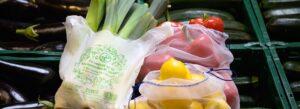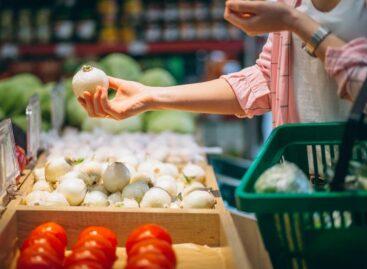Big change comes at Tesco
Tesco eliminates the use of disposable plastic bags available so far in the vegetable and vegetable class. The shops can now be used several times in the shops, a biologically degradable bag or so -called. It will be available again to replace previous lightweight horses. In addition, customers can bring their own bags, as before, and at the entrance of most stores they regularly find free cardboard boxes from secondary packaging, which can also be packed. With an environmentally friendly step, Tesco reduces the amount of plastic waste by 500 tonnes per year.

(Photo: Tesco Hungary)
“Our goal is to encourage environmentally conscious shopping habits and, as part of it, strive to minimize the extent of plastic waste in our operation and households. At the same time as the disposable plastic bags on March 21, we switched to greener packaging materials, which can save 500 tons of plastic per year. The newly introduced biologically degradable bag can be composted, while the re -bag can be reused every time when buying. However, many times, for example, a cluster banana or a zucchini, they do not need them, so we encourage those who come to us to buy without packaging as much as possible. We are confident that customers will understand and positively accept the change to protect our planet together with sustainability, ”said Nóra Hevesi, Tesco’s communications manager.
Bag, bag, organic bag
The space content of the biologically degraded bag is approx. 4.5 liters and maximum load capacity of 2 kilograms. One of its biggest benefits is that it contains starch as a renewable ingredient, so it can be composted and is degraded within one year. If composting is not feasible, the bag should be placed in the municipal collector, unlike the usual ones, not the usual. However, the product can be used several times within the expiry date, so it is not necessary to buy it again every time when buying.
An even more environmentally friendly alternative is the 100 percent polyester, one -liter, 4 -kilogram re -bag, which can be reused with unlimited number of times with intended use. Between March 20 and April 16, Tesco sells the re -bag with Clubcard for only 99 forints to encourage the move in this direction. In addition, the supermarket chain regularly puts free cartons that can be taken free of charge to the entrance of most shops, so that customers can pack them into them after payment, giving a new life to secondary packaging.
Tesco is one of the largest salesmen of packaging products in Hungary
These include bakery goods and various vegetables and fruits. To sell as many products as possible without packaging, the supermarket chain will remove plastic packaging in all possible cases and make sure the remaining packaging can be recycled. By 2025, the packaging of all its own brand products will be 100 % recycled. Three full product categories have already been achieved: about 200 household, 90 rice and pasta products, as well as pre-packaged vegetables and fruits are placed on the shelves. The company also makes sure that its own operation is as sustainable as possible. In their 2020/21 fiscal year, nearly 1,200 tons of plastic and more than 15,000 tons of cardboard were re-operated.
Related news
Fashion, drones and sustainability – the new face of agriculture at the AgriTech InnoExpo event
🎧 Hallgasd a cikket: Lejátszás Szünet Folytatás Leállítás Nyelv: Auto…
Read more >Related news
ZEW: Economic expectations worsened in Germany and the euro area in February
🎧 Hallgasd a cikket: Lejátszás Szünet Folytatás Leállítás Nyelv: Auto…
Read more >








